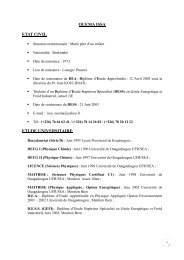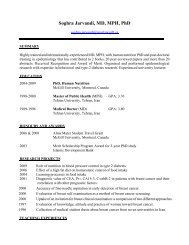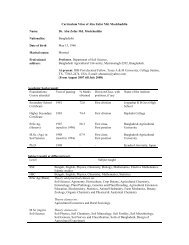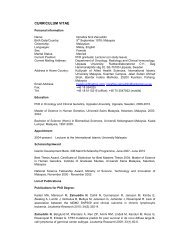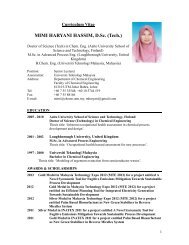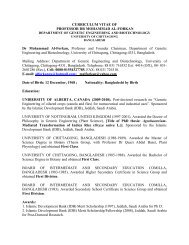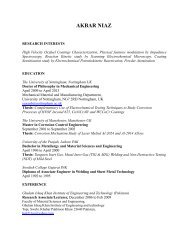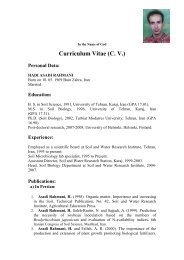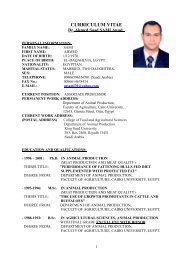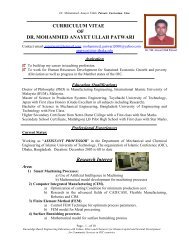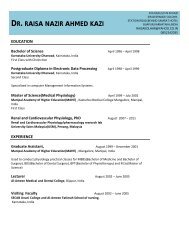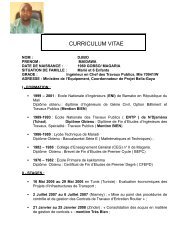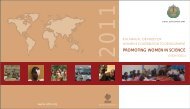Engineering: issues, challenges and opportunities for development ...
Engineering: issues, challenges and opportunities for development ...
Engineering: issues, challenges and opportunities for development ...
You also want an ePaper? Increase the reach of your titles
YUMPU automatically turns print PDFs into web optimized ePapers that Google loves.
ENGINEERING: ISSUES CHALLENGES AND OPPORTUNITIES FOR DEVELOPMENTExample IDTC initiative – International Student SupportIn line with the comments from the university’s strategicplan of 1997, mentioned above, about recruiting moreinternational students <strong>and</strong> building on the experience ofIDTC, the Faculty made a decision to be proactive in thisarea <strong>and</strong> in 1998 recruited the then Director* of IDTC asAssistant Dean, International. The International StudentSupport Unit in the Faculty was set up in 1998. The Unit’srole was multi-faceted, <strong>and</strong> involved:■■■■■provision of academic <strong>and</strong> other support to overseasstudents both undergraduate <strong>and</strong> postgraduate,including Study Abroad <strong>and</strong> exchange;encouragement of international linkages <strong>for</strong> theFaculty;.<strong>development</strong> of exchange programmes <strong>and</strong> other <strong>for</strong>msof international experience <strong>for</strong> Australian students inthe Faculty:promotion of the University’s Cultural Diversity Policywithin the Faculty <strong>and</strong> its programmes;<strong>development</strong> of <strong>opportunities</strong> <strong>for</strong> professionalexperience <strong>and</strong> industry interaction <strong>for</strong> overseasstudents;■■support <strong>for</strong> the Faculty’s overseas recruitmentoperations; <strong>and</strong>fostering of Faculty overseas alumni links.This programme <strong>and</strong> can be seen to have three components.Firstly, overseas students in the Faculty should have anexperience that not only is superior academically <strong>and</strong> professionally,but is also pleasant <strong>and</strong> enriching from a social<strong>and</strong> cultural viewpoint.Secondly, the Australian students should be encouragedto develop an international viewpoint <strong>and</strong>, if possible,experience a different cultural environment. At this pointit is worth reporting that over 70 per cent of Universityof Melbourne Australian engineering students are completingdouble degrees, combining engineering with Arts,Commerce, Science or Law, so they are already exposed todifferent professional cultures. There is also a Diploma ofModern Languages at the university, which can be takenconcurrently with another degree, so that engineering studentscan complete their engineering degree <strong>and</strong> at thesame time develop fluency in another language.Thirdly, <strong>and</strong> this is in many ways the most difficult challenge,the academic staff must be encouraged to developinternational linkages <strong>for</strong> research <strong>and</strong> other professionalactivities, to internationalize the curriculum of the subjectsthey teach <strong>and</strong> to see the overseas students they teachor supervise <strong>for</strong> higher degrees as a valuable enrichingresource who have a valid world view, even if it is differentfrom that of the lecturer.There are other outcomes but the above report illustrateswhat can be done. The importance of inclusion in technologicalcurricula of studies in national <strong>and</strong> community<strong>development</strong> <strong>and</strong> cross-cultural experience is commonlyunderestimated <strong>and</strong> there<strong>for</strong>e commonly not implemented.Professional leaders should give some thoughtto the potential value of encouraging academic leadersto provide the balance in education that is available if theconcept of environment <strong>for</strong> professional practice is widenedin this way.* Associate Professor D. F. Stewart.folio heavily oriented to those countries with a great need todevelop their irrigation infrastructure), which could be managedconsistently through the Centre. However, <strong>development</strong>(insofar as it relates to developing countries) was no longerthe only focus.A similar change was another Faculty move to translate theCentre <strong>for</strong> International Irrigation Training <strong>and</strong> Research(CIITR) into IDTC. The effects were somewhat complementaryto the absorption of the Environmental <strong>Engineering</strong> Programbecause CIITR had a small cohort of students but a very welldeveloped project folio heavily oriented to those countrieswith a great need to develop their irrigation infrastructure.The two semesters of coursework encouraged the academicdepartments to develop new graduate subjects; the conventionalcivil engineering subjects were thus joined by courseworkin such disciplines as Environmental <strong>Engineering</strong>,Irrigation Management, Energy Studies, Facilities Management<strong>and</strong> Project Management. This diversity of discipline inthe elective part of the Master <strong>and</strong> Graduate Diploma programmeswas brought together around the core of DevelopmentTechnologies <strong>and</strong> by the recruitment of academic stafffrom countries outside Australia.Academic programmes of this kind will always be subject to<strong>challenges</strong>, most of which are essentially healthy. Such programmesare perceived as being outside the mainstream. Thatrequires the kind of self-appraisal <strong>and</strong> adaptability that is essentialin any activity where there is competition <strong>for</strong> resources <strong>and</strong><strong>for</strong> enrolling c<strong>and</strong>idates. It is of paramount importance to workcontinuously to maintain the relevance of the programme tothe ‘environment’ <strong>for</strong> which the academic service is provided. Itis very easy <strong>for</strong> any academic unit to become introspective <strong>and</strong>self-satisfied, but particularly so when its raison d’etre is to beinterested primarily in places that are remote from ‘home’.7.4.2 Botswana Technology CentreMokubung MokubungThe Botswana Government recognizes the need to address theUnited Nations Millennium Development Goals (UN, 2000) 79in order to tackle national <strong>development</strong> <strong>issues</strong>, especially theacceleration of poverty reduction, employment creation <strong>and</strong>economic diversification (Budget Speech, 2008). 80 Poverty isstill a challenge in Botswana <strong>and</strong> there<strong>for</strong>e it remains a priority<strong>for</strong> Government to address (Budget Speech, 2009). 81 The79 UN. 2000. UN Millennium Development Goals. United Nations. Available at: http://www.un.org/millenniumgoals/ (Accessed: 28 May 2010).80 Budget Speech, 2008, Botswana Budget Speech of 2008. Available at: http://www.sarpn.org.za/documents/d0002982/index.php (Accessed: 28 May 2010).81 Budget Speech, 2009, Botswana Budget Speech of 2009. Available at: http://www.parliament.gov.bw/docs/documents/2009BudgetSpeech.pdf(Accessed: 28 May 2010).352



